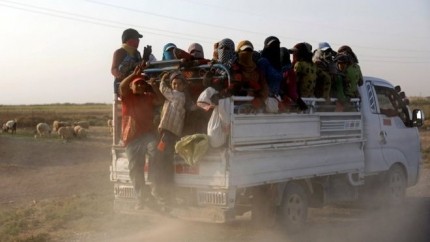
September has been the deadliest month in Syria’s civil war so far this year, a monitoring group has said.
The UK-based Syrian Observatory for Human Rights (SOHR) said more than 3,300 people had died in September, including 995 civilians.
Of those civilian deaths, it said about 70% were caused by Russian, Syrian government, or coalition air strikes.
The group bases its casualty reports on information provided by a network of activists in Syria.
It counted 207 children among the civilian dead, along with some 790 pro-government fighters, more than 700 from so-called Islamic State (IS) and al-Qaeda affiliates, and some 550 rebels.
The SOHR says it is a non-political and independent monitoring group, though it does not publish its methodology or verification process.
Many of the deaths have occurred during the fighting between the country’s multiple factions and IS. But air strikes in Syria have continued as the jihadist group has lost most of its territory in the country.
An alliance of Kurdish and Arab fighters has mostly reclaimed the northern city of Raqqa, the group’s former de facto capital.
Its last remaining stronghold in Syria is the province surrounding the eastern city of Deir al-Zour.
Russian air forces are supporting the Syrian military in their attempts to fully retake the city.
A long-running siege of Deir al-Zour was broken by Syrian military forces in early September. In the aftermath, the SOHR said dozens of civilians had been killed in air strikes outside the city.
The Syrian Defence Forces – fighters which oppose Syrian President Bashar al-Assad but are also fighting IS – have also claimed to be hit by Russian and Syrian air strikes, a charge which Russia denies.
And last week, Human Rights Watch said a pair of air strikes by the US-led coalition in March had killed at least 84 civilians.
IF YOU WOULD LIKE TO KNOW HOW GAIN IS INVOLVED, CLICK HERE.
(Source)
(Image Source: Reuters)
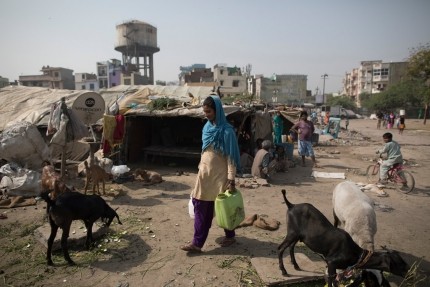
12 July 2017 – Some three in ten people around the world lack access to safe and readily available water at home, and almost six in ten to safely managed sanitation, a new United Nations report has warned, calling on countries to do more to fulfil these basic human needs.
According to the World Health Organization (WHO) and the UN Children’s Fund (UNICEF) joint report, Progress on Drinking Water, Sanitation and Hygiene: 2017 Update and Sustainable Development Goal Baselines, many homes, healthcare facilities and schools also lack soap and water for handwashing, putting the health of all people – but especially young children – at risk for deadly diseases.
“Safe water, sanitation and hygiene at home should not be a privilege of only those who are rich or live in urban centres,” Tedros Adhanom Ghebreyesus, the WHO Director-General, said in a news release, announcing the findings and noting that those living in rural areas are the worst affected.
As a result of lack of these basic services, millions fall ill to diseases – that could, otherwise, have been easily prevented – such as diarrhoea which claims the lives of 361,000 children under the age of five die, every year, noted the UN agencies.
“Safe water, effective sanitation and hygiene are critical to the health of every child and every community – and thus are essential to building stronger, healthier, and more equitable societies,” underscored Anthony Lake, the Executive Director of UNICEF.
‘Significant’ inequalities persist
Good hygiene is one of the simplest and most effective ways to prevent the spread of diseases such as diarrhoea, cholera, dysentery, hepatitis A, and typhoid.
However, findings in the report revealed that access to water and soap for handwashing varies immensely in the 70 countries with available data, from 15 per cent of the population in sub-Saharan Africa to 76 per cent in western Asia and northern Africa.
These significant inequalities also put the implementation of the Sustainable Development Goals (SDGs), in particular Goal 6 on ensuring availability and sustainable management of water and sanitation for all at risk.
Backed by the data, the two UN agencies also warned that in as many as 90 countries around the world, progress towards basic sanitation is too slow, “meaning they will not reach universal coverage by 2030”.
In addition, hundreds of millions without even ‘basic’ drinking water
According to the report, of the 2.1 billion people who do not have safely managed water, 844 million do not have even a basic drinking water service.
This includes 263 million people who have to spend over 30 minutes per trip collecting water from sources outside the home, and 159 million who still drink untreated water from surface water sources, such as streams or lakes.
Furthermore, of the 4.5 billion people who do not have safely managed sanitation, 2.3 billion still do not have basic sanitation services, including nearly 600 million people who share a toilet or latrine with other households, and 892 million people – mostly in rural areas – who defecate in the open.
Improvements these services, are therefore essential not only for realizing the 2030 Agenda for Sustainable Development and giving the most vulnerable a chance at a better future.
“As we improve these services in the most disadvantaged communities and for the most disadvantaged children today, we give them a fairer chance at a better tomorrow,” said Mr. Lake.
In the same vein, Mr. Ghebreyesus underscored: “These are some of the most basic requirements for human health, and all countries have a responsibility to ensure that everyone can access them.”
GAIN PROVIDES SAFE WATER THROUGH DEEP-CAPPED WATER WELLS AS WELL AS OTHER OPPORTUNITIES, IN ALIGNMENT WITH WASH (WATER AND SANITATION HYGIENE), TO FURTHER DEVELOP COMMUNITIES.
IF YOU WOULD LIKE TO KNOW HOW GAIN IS HELPING PROVIDE SOLUTIONS TO THIS WATER CRISIS, CLICK HERE.
(Source for Article: http://www.un.org/apps/news/story.asp?NewsId=57163)
(Source for Photo: UNICEF/Prashanth Vishwanath)
I trust that you had a good time of rest over the Christmas holidays with your family and friends. But more importantly that you had opportunity to celebrate God’s love for you and your family, through the sending of His Son Jesus Christ, our Lord and Saviour. A new year is before us, and I pray that you will be richly blessed by God and live in His love day by day.
The new year can also bring about changes in our lives, “seasons” as Solomon called them in the book of Ecclesiastes. I want to take this opportunity to share with you such a season in my life. Over the last two years, I have felt the time approaching when God was speaking to my heart that I should step down from the day-to-day oversight of Global Aid Network (GAiN) and the JESUS Film Church Planting Strategy (JFCPS). I turned 68 in September, and after almost 15 years of leading GAiN, my wife Susan and I felt that the time had come to step aside and make room for a new leader whom God would have to choose to take over the reins. In preparation for this time, I had been working on a transition strategy with the President of Power to Change, Rod Bergen, the Board of GAiN and the GAiN Lead Team.
In June of 2016, this transition strategy was presented to the staff of GAiN and JFCPS. One month later, the transition plans were presented at the Power to Change Staff Conference, after which the job posting for my position was advertised. Over the next six months, many people were praying that God would provide His candidate for the job.
I am pleased to announce to you that God has indeed answered our prayers. He has provided a man who has answered the call to serve. May I introduce to you Ray Sawatsky, the new Executive Director and Chief Executive Office of GAiN Canada and JFCPS.
Ray and his family feel that God has been preparing Ray for this position for some time. I am in agreement with that and fully endorse him in that role. I am so excited for Ray to begin in his new calling, indeed a new “season” in his life and the ministry of GAiN and JFCPS.
Ray has a great passion for international development and humanitarian relief work. Ray and his wife Ginny (and his two teenage daughters) are passionate about serving internationally and showing God’s love to those in need. As the Managing Partner of Hatch, Ray provided consulting services for charitable and philanthropic organizations advising donors on international development opportunities for giving. Ray has served on the boards of multiple non-profits and has significant experience leading mission’s teams overseas. As the former Director of Stakeholder Relations for Cardus, a Christian think tank, Ray worked with experts to provide independent research to the public to matters that would influence our society from a Christian perspective. With his background in education, he has designed courses and written curriculum for Global Education and international development.
I look forward to coming along side of Ray in his new calling and supporting him in his new role. I have also agreed to take on the position of Director of Strategic Initiatives. In this role I will work closely with Ray to take the organization forward into the next stage of growth and help give vision to GAiN in the coming years. This role will allow me to continue to focus my time, effort and talents on the continued strategic growth of GAiN, but without the responsibilities of running the day-to-day operations.
While I am not leaving GAiN, the operations and many of the relational interactions will begin to change and transition to Ray. I want to take a moment to thank you for your partnership with GAiN in making Christ known everywhere God has allowed us to work over the years. I have appreciated your support, friendship, and prayer. Knowing you were on this journey with GAiN and JFCPS has been, and will be for Ray, a blessing beyond measure or words.
With our hands and hearts joined together in this calling “to demonstrate the love of God, in word and deed, to hurting and needy people around the world, through relief and development projects” Ray and I ask for your prayers. God has tremendously blessed the work of GAiN and the JFCPS. Together, many more lives will be transformed today, tomorrow and into eternity through the Gospel of Jesus Christ.
Thank You,
William (Bill) Blaney
Executive Director of Global Operations
Global Aid Network (GAiN) Canada
Ray Sawatsky
Executive Director and Chief Executive Officer
Global Aid Network (GAiN) Canada
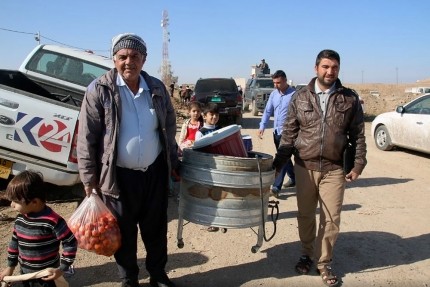
28 December 2016 – Since operations began to retake the Iraqi city of Mosul from the Islamic State of Iraq and the Levant (ISIL) two months ago, some 114,042 people have been displaced and as many as one million are out of reach of humanitarian assistance.
According to the latest report from the UN Office for the Coordination of Humanitarian Affairs (OCHA), the ongoing conflict has rendered it is impossible to state a definitive estimate on the number of people who are still living in ISIL-controlled areas.
However, the humanitarian community is concerned that conditions for these communities are deteriorating, as basic goods have not been replaced in western parts of the city since the city’s supply routes were closed last month.
Of particular concern is the safety and security of children, as more than 50,000 have been affected due to the Mosul military operation and surrounding conflict. Hamida Lasseko, Deputy Representative of the UN Children’s Fund (UNICEF) in Iraq, told UN News that the agency is working with the Iraqi Government to provide basic services, psychosocial support, and education to children.
“This is going to be our main area of focus – to advocate for the education of children. This will also help to keep the children safe: they will be protected from being recruited, affected from the armed conflict, and they will also be able to access their basic rights,” she said.
“We continue to ask all those who are involved in the conflict to leave children to grow as children so that they have a normal life,” Ms. Lasseko said, emphasizing that “they should stop using children for the benefit of the war.”
For those who are now living at camps, humanitarian assistance includes basic services such as clean drinking water, latrines, medical assistance. OCHA emphasized that providing new plots to accommodate people who have recently fled is an urgent priority: just last week, an additional 10,170 people were displaced.
However, security incidents have threatened aid operations in eastern Mosul. On 22 December, three suicide car bombs exploded in Gogchali, an area on the eastern outskirts of the city adjacent to the main access route. These explosions were in addition to mortar fire that killed aid workers and beneficiaries. just a few days earlier, as well as a significant uptick in trauma injuries over the past month.
Meanwhile, flooding due to ongoing rains has threatened water safety, and the arrival of winter brings dropping temperatures and harsher conditions. UN agencies and stakeholders are working to ensure that civilians have adequate protection from the cold, and one NGO is building a field hospital to shorten ambulance journeys and reduce pressure on Erbil hospitals.
GAIN IS WORKING IN IRAQ. IF YOU WOULD LIKE TO READ MORE ABOUT OUR RELIEF EFFORTS, CLICK HERE.
Image Source: Photo: WFP/Alexandra Murdoch
Article Source: http://www.un.org/apps/news/story.asp?NewsId=55884
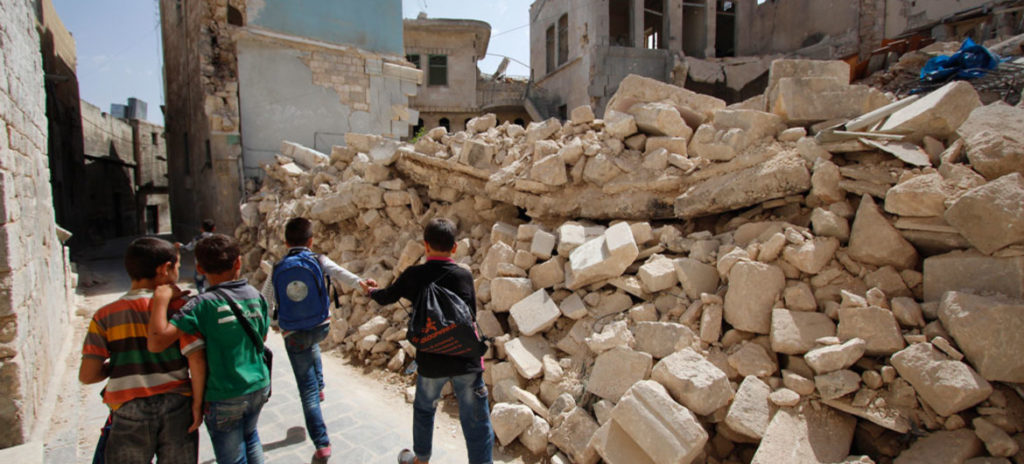
10 November 2016 – The United Nations humanitarian envoy for Syria today urged actions to stave off the threat of mass hunger in eastern Aleppo before the arrival of winter that he fears could be “a real killer” for a quarter of a million people trapped there.
“The fifth war winter is starting in Syria. There is no doubt it will be the worst in this cruel war, and I fear it will be a real killer in too many places,” Jan Egeland, Special Advisor to the UN Special Envoy for Syria, told reporters in Geneva.
“Some of the areas are freezing cold, horrible conditions, and people will be in need of digging themselves down in the ground in extreme cases,” he said, explaining that humanitarian convoys are being blocked physically or administratively from reaching them, or they cannot depart because of crossfire or insecurity.
He said that the last time eastern Aleppo was reached with significant humanitarian supplies was the beginning of July and reports imply that the last food rations are being distributed now. “There will not be more to distribute next week,” he said.
Mr. Egeland said that the UN put forward a humanitarian initiative last week, which has been translated into Arabic and presented to the negotiating parties, including Russia, the Syrian Government and the armed opposition groups.
He said that the initiative calls for four actions to save the people in eastern Aleppo: distribution of medical supplies to the medical facilities; medical evacuations for the estimated 300 or so patients, together with their families; delivery of food and other urgent humanitarian relief supplies; and dispatch of more personnel to provide medical relief.
“None of the four elements are conditional on the others,” he said.
“Having heard back from the [humanitarian] taskforce today, we are hopeful that both sides will, since the situation is so horrendous as it is, grant us the opportunity to both come with supplies into east Aleppo, and evacuate wounded and others out of east Aleppo,” he said.
The International Syria Support Group (ISSG) has established the respective taskforces on humanitarian aid delivery and a wider ceasefire. They have been meeting separately since early this year on a way forward in the crisis. Russia and the United States are the co-chairs of the taskforces and the ISSG, which also comprises the UN, the Arab League, the European Union and 16 other countries.
“I do not think anybody wants a quarter of a million people to be starving in east Aleppo,” he said. “I do believe we will be able to avert mass hunger this winter.”
There are also hardships in western Aleppo, which can still be reached with aid, he said, warning that civilians there are dying every single week from the continued fighting.
Mr. Egeland also noted that the situation has not gotten better in the other besieged areas.
As for Madaya, Zabadani, Foah and Kafraya under the ‘Four Towns Agreement,’ all relief into these areas and medical evacuations out have been paralyzed because of the “conditioning” between Iran and Ahrar al-Sham.
“I have not seen a place where there has been so much politicization, manipulation of aid, as we have seen in Syria in recent months. It has to stop,” he said.
IF YOU WOULD LIKE TO KNOW WHAT GAIN IS DOING REGARDING THE SYRIAN CRISIS, CLICK HERE.
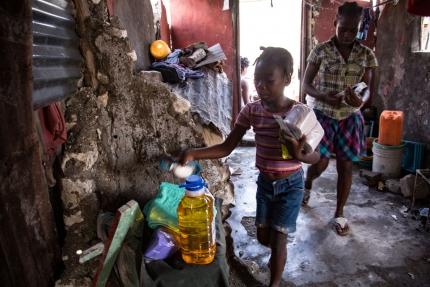
4 November 2016 – As Haiti struggles to recover from the massive destruction wrought by Hurricane Matthew, which pummelled the tiny island one month ago today, the United Nations warned that while its seems as if “the world has moved on,” Haiti’s needs are vast, exemplified by the nearly 600,000 children being stalked by disease, hunger and malnutrition and in need of assistance.
“One month after the hurricane, life for more than half a million children in Haiti is still far from back to normal,” said Marc Vincent, Haiti Representative for the UN Children’s Fund (UNICEF), in a news release. “Too many children are still homeless, hungry, out of school and in danger. We are scaling up our response and are determined to help as many of them as possible as fast as we can.”
UNICEF said there have been at least 1,000 suspected cholera cases among children in the past month. Out of 219 cholera treatment centres in the country, 18 have been damaged in the worst-hit departments of Grand’Anse and South, further complicating efforts to contain the disease.
The total destruction the Category 4 storm inflicted on crops, food stock and livestock in some of the worst affected areas have left over 800,000 people in need of immediate food assistance and more than 112,000 children at risk of acute malnutrition.
An estimated 50,000 children have been left homeless and are staying in temporary shelters. Another 3,500 children living in institutions need help accessing nutrition, water and sanitation services.
More than 700 schools have been affected and about 86 schools have been used as temporary shelters, causing school disruption for at least 150,000 children.
UNICEF is working with national and other partners to provide basic assistance to the most vulnerable children. They are providing 100,000 people a day with safe water, organizing a cholera vaccination campaign that will be launched next week to immunize up to 900,000 people, and providing cholera prevention kits that contain water purification tablets, soap and oral rehydration salts. Between 100 and 200 kits are distributed every day.
In addition, they are delivering an integrated package of services to prevent and treat malnutrition among children under five as well as pregnant and breastfeeding mothers living in the hurricane affected areas, replenishing vaccines and restoring the cold chain so that routine immunization can resume in the health centres that are still operational and in mobile clinics, and distributing emergency medical supplies to 18 health centres.
Joint actions also include setting up mobile child friendly spaces where vulnerable children and families can receive psychosocial support, and training 60 volunteers to staff them, and repairing 22 schools and distributing school-in-a-box and early childhood development kits so that children can resume their learning as soon as possible.
UNICEF requires over $23 million through the end of the year to meet children’s humanitarian needs following the hurricane, including for the cholera response. So far, it has received a mere $6 million.
Jens Laerke, spokesperson for the Office for the Coordination of Humanitarian Affairs (OCHA), told reporters in Geneva that, according to the latest figures from the authorities in Haiti, Matthew has so far caused 546 deaths and left 438 people injured.
He said that needs are vast, especially in the areas of quality water, education, shelter, child protection, health and nutrition. A total of 1.4 million people are in need of humanitarian assistance, and an estimated 40 per cent of them are children. The UN emergency humanitarian appeal for $120 million is far only 33 per cent funded.
Haiti needs support to restore, rebuild health services
Haiti needs support to restore and rebuild its health services at various levels, ranging from cholera treatment centers to community health centers to major hospitals, according to Dr. Jean-Luc Poncelet, the Pan American Health Organization/World Health Organization (PAHO/WHO) representative in Haiti.
In the country’s South, “the government faces challenges in restoring health facilities in affected areas and urgent repairs to restore functionality have been identified,” he said.
In Sud Department, 28 per cent of health facilities sustained severe damage and eight per cent are closed, while in Grand’Anse, 43 per cent of health facilities were severely damaged and seven per cent are closed. Of the 74 cholera and acute diarrhea treatment facilities in Haiti, 34 are fully functional, while 40 sustained various levels of damage.
Restoring health services to a functional level requires not only fixing structures, but providing electricity and water and sanitation, as well as helping many health workers who themselves have been severely affected by the hurricane’s destruction, according to the Haiti Ministry of Public Health.
“The major needs are to renovate existing health structures with durable repairs, to increase humanitarian assistance to rural areas, and to improve water quality and sanitation,” Mr. Poncelet said.
The latest figures from the Haitian government show that 175,509 Haitians are still living in shelters, while more than 1.4 million people are in urgent need of humanitarian assistance.
PAHO/WHO teams identified five priority areas of action for the health sector, estimating that $9 million in emergency funding is needed to carry out essential activities.
These priorities are: restoration of health care delivery capacity and access to health services in the most affected areas; increased epidemiological surveillance to support early detection and timely management of disease outbreaks; intensification of vector-control and protective environmental health measures in impacted areas; rapid and effective response to cholera outbreaks in affected communities; and support for efficient coordination of humanitarian assistance and management of information to effectively address the most urgent humanitarian needs.
A vaccination campaign is planned to start Nov. 8, targeting 820,000 people in 16 communes affected by Hurricane Matthew and that have reported cholera cases or deaths. To prevent additional cholera cases, which are likely to increase in the rainy season from now until December, it is also important to advance on water purification, health promotion, and sanitation at the same time.
Bettina Luescher, spokesperson for the World Food Programme (WFP), said that the agency has delivered food to 400,000 people, as part of its work to support the Government in its work. The situation is dire on the ground, with huge logistical challenges, but together with its partners WFP has reached people by truck, helicopter and boat.
Some 140,000 people are still displaced and living in temporary shelters. The food situation is worrisome: in areas hit by the hurricane crops have been destroyed, along with livestock and seeds, local markets are running out of food and the prices of imported goods are rising.
The planting season is supposed to happen this month and will be affected, which meant in turn that the next harvest, in the early months of 2017 will be affected. WFP aims to reach 800,000 people. In order to do that, it has appealed for $58 million overall and still needs $40 million urgently.
(Source)
(Image Source: UNICEF/Roger LeMoyne)
IF YOU WANT TO KNOW MORE ABOUT HOW GAIN IS WORKING IN HAITI, CLICK HERE.
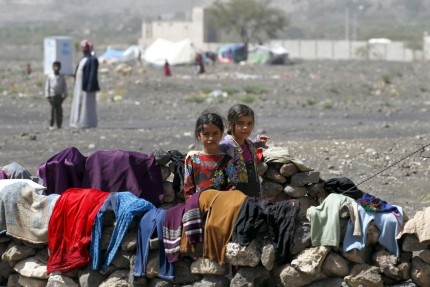
20 June 2016 – The number of people displaced from their homes due to conflict and persecution last year exceeded 60 million for the first time in United Nations history, a tally greater than the population of the United Kingdom, or of Canada, Australia and New Zealand combined, says a new report released on World Refugee Day today.
The Global Trends 2015 compiled by the Office of the UN High Commissioner for Refugees (UNHCR) notes that 65.3 million people were displaced at the end of 2015, an increase of more than 5 million from 59.5 million a year earlier.
The tally comprises 21.3 million refugees, 3.2 million asylum seekers, and 40.8 million people internally displaced within their own countries.
Measured against the world’s population of 7.4 billion people, one in every 113 people globally is now either a refugee, an asylum-seeker or internally displaced – putting them at a level of risk for which UNHCR knows no precedent.
On average, 24 people were forced to flee each minute in 2015, four times more than a decade earlier, when six people fled every 60 seconds.
Syria, Afghanistan and Somalia produce half the world’s refugees, at 4.9 million, 2.7 million and 1.1 million, respectively.
Colombia had the largest numbers of internally displaced people (IDPs), at 6.9 million, followed by Syria’s 6.6 million and Iraq’s 4.4 million.
While the spotlight last year was on Europe’s challenge to manage more than one million refugees and migrants who arrived via the Mediterranean, the report shows that the vast majority of the world’s refugees were in developing countries in the global south.
In all, 86 per cent of the refugees under UNHCR’s mandate in 2015 were in low- and middle-income countries close to situations of conflict.
Worldwide, Turkey was the largest host country, with 2.5 million refugees. In terms of the refugee-to-population ratio, Lebanon has the highest proportion, with nearly one refugee for every five citizens.
Distressingly, children made up an astonishing 51 per cent of the world’s refugees in 2015, with many separated from their parents or travelling alone, UNHCR said.
“Our responses to refugees must be grounded in our shared values of responsibility sharing, non-discrimination, and human rights and in international refugee law, including the principle of non-refoulement,” UN Secretary-General said in his message on the Day.
“World Refugee Day is a moment for taking stock of the devastating impact of war and persecution on the lives of those forced to flee, and honouring their courage and resilience,” he said, noting that it is also a moment for paying tribute to the communities and States that receive and host them, often in remote border regions affected by poverty, instability and underdevelopment, and beyond the gaze of international attention.
Last year, more than one million refugees and migrants arrived in Europe across the Mediterranean, in unseaworthy dinghies and flimsy boats. “Thousands did not make it – tragic testimony to our collective failure to properly address their plight,” Mr. Ban said.
He stressed that meanwhile, divisive political rhetoric on asylum and migration issues, rising xenophobia, and restrictions on access to asylum have become increasingly visible in certain regions, and the spirit of shared responsibility has been replaced by a hate-filled narrative of intolerance.
“With anti-refugee rhetoric so loud, it is sometimes difficult to hear the voices of welcome. But these do exist, all around the world,” he said, acknowledging an extraordinary outpouring of compassion and solidarity shown by host communities.
The UN chief drew attention to the General Assembly’s High-Level Meeting on addressing large population movements on 19 September, which he said will offer an historic opportunity to agree a global compact, with a commitment towards collective action and greater shared responsibility for refugees at its core.
This year, hopeful signs are hard to find
UN High Commissioner for Refugees, Filippo Grandi, said that each year, UNHCR seeks to find a glimmer of hope in the global statistics, but “this year the hopeful signs are hard to find.”
He warned that instead of burden sharing, nations are closing their borders and that instead of political will, there is political paralysis. And humanitarian organizations like his are left to deal with the consequences, while at the same time struggling to save lives on limited budgets.
Yet, there is cause for hope. Citing host communities, individuals, and families opening their homes, he said “these ordinary people see refugees not as beggars, competitors for jobs, or terrorists – but as people like you or me whose lives have been disrupted by war.”
“UNHCR sees 2016 as a watershed moment for the refugee cause,” he stressed. As wars spiral out of control, this must be a year to take collective responsibility and action to end the conflicts which force people to flee and also a year to help the millions of people whose lives have been destroyed by violence.
“World leaders can no longer watch passively as so many lives are needlessly lost,” he said, also noting that the upcoming General Assembly meeting on addressing large movements of refugees and migrants will put all to the test.
For its part, UNHCR launched last week the #WithRefugees initiative to generate momentum towards that meeting, he added.
Numbers do not capture hardship of displaced
Mogens Lykketoft, UN General Assembly President, said the numbers do little justice to the pain and trauma that this crisis is causing for individual women, men and children across our world.
“They fail to capture the hardship of those who flee and the fear of those who wait anxiously behind. They fail to capture the hopelessness of those held in detention centres or the final thoughts of those lost at sea without even a whisper,” he said.
He highlighted several points, including that the international community must intensify its efforts to find political solutions to conflicts, as they are the main drivers of humanitarian need. The UN and other institutions and agencies must be provided with sufficient and predictable resources needed to fulfil their mandates and respond to the incredible levels of need.
In 2014, children constituted 51 per cent of the refugee population, with half of these missing out on primary education, he said. The 2030 Agenda for Sustainable Development to leave no one behind has placed a new obligation on all to reach those in situations of conflict, disasters, vulnerability and risk.
Citing that almost nine out of every 10 refugees, 86 per cent, are in regions and countries considered economically less developed, he urged the international community to enhance its solidarity with refugee hosting countries.
Given the scale of the crisis, current levels of third-country resettlement need to be reviewed, he pointed out. In 2014, only 15 per cent of the global resettlement needs were met. At least fifty thousand persons, including thousands of children died in the past two decades while seeking to cross international borders. Governments must create safe, orderly and regular pathways for refugees to move to other countries.
Violations of international humanitarian and human rights law are of grave concern. All must speak out in the face of serious violations of international law. Xenophobic and racist rhetoric seems not only to be on the rise, but also to be becoming more socially and politically acceptable. This needs to change, he said.
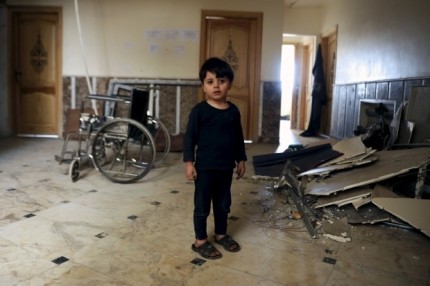
The United Nations envoy for Syria appealed to the U.S. and Russia to intervene to help revive Syrian peace talks that sputtered to a pause Wednesday, saying a recent spike in fighting has overshadowed the talks and put an increasingly feeble truce in “great danger.”
Staffan de Mistura spoke to reporters early Thursday after briefing the UN Security Council via videoconference about the largely stalled indirect talks between the Western- and Saudi-backed opposition and envoys from President Bashar al-Assad’s government, which has the backing of Moscow.
After 60 days, he said, the cessation of hostilities agreed to by both sides “hangs by a thread.”
“I really fear that the erosion of the cessation is unraveling the fragile consensus around a political solution, carefully built over the last year,” de Mistura said in his council briefing obtained by The Associated Press. “Now I see parties reverting to the language of a military solution or military option. We must ensure that they do not see that as a solution or an option.”
The current effort to end the five-year Syria conflict was largely spearheaded by U.S. Secretary of State John Kerry and Russian Foreign Minister Sergey Lavrov, backed by major global and regional powers who formed the International Syria Support Group. It includes 17 countries as well as the United Nations, Arab League, European Union and Organization of Islamic Cooperation.
‘Downward spiral’
De Mistura appealed not only for U.S.-Russia intervention but for international support, calling in the Security Council briefing for another ministerial meeting of the International Syria Support Group “lest we lose the window of opportunity to reverse the negative downward spiral.”
He stressed that the talks may not survive unless the fighting subsides, and that won’t happen “without some sort of political solution on the horizon.”
De Mistura said he hoped that the talks would resume in May, and he predicted the overall process would continue as previously planned through July. But he stopped short of setting a specific date, pointing to the recent upsurge in fighting, notably in and around Aleppo, Syria’s largest city before the war.
Lamenting the worsening violence, he said that “in the last 48 hours, we have had an average of one Syrian killed every 25 minutes, one Syrian wounded every 13 minutes … How can you have substantial talks when you have only news about bombing and shelling?”
Speaking at the end of a third session of Syria peace talks this year, de Mistura said the truce brokered by the U.S. and Russia had pulled off a “miracle” by sharply reducing violence in March, but acknowledged that the renewed fighting has put the cessation of hostilities “in great danger.”
U.S., Russia must work together: UN
He called for a “U.S.-Russian initiative at the highest level” to help reinforce it.
“There is no reason that both of them — who have been putting so much political capital in that success story and have a common interest in not seeing Syria ending up in another cycle of war — should not be able to revitalize what they created, and which is still alive, but barely,” he said of the two countries.
U.S. State Department spokesman John Kirby said he shared de Mistura’s concerns about the increased violence jeopardizing the process and urged Russia to press the Assad regime “to fulfill its commitments.”
The talks foundered last week after the Western- and Saudi-backed opposition called the High Negotiating Committee suspended formal participation in the indirect talks with Assad’s envoys to protest alleged government cease-fire violations, a drop in humanitarian aid deliveries and no progress in winning the release of detainees in Syria.
De Mistura suggested back-channel work between Moscow and Washington was already under way to help the truce, and that a revival of it would help bring the two sides back to the table.
“I know that both the Russian Federation and the U.S. are talking among themselves on how to salvage on what has been actually a remarkable success — but needs to be sustained,” he said, referring to the cease-fire. If it is revived, he predicted: “It will not be difficult for everyone to come back around the table.”
TO FIND OUT HOW WE ARE INVOLVED IN SYRIA, CLICK HERE.
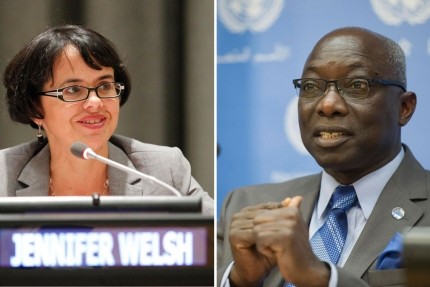
13 October 2015 – Senior United Nations human rights officials today expressed their alarm at the rise in violent rhetoric by influential religious leaders – including calls for “holy war” against certain faiths – in relation to the situation in Syria.
The UN Secretary-General’s Special Adviser on the Prevention of Genocide, Adama Dieng, and Special Adviser on the Responsibility to Protect, Jennifer Welsh, condemned the recent call by clerics in Saudi Arabia for Sunni Muslims and their States to support a “holy war” against Shia Muslims and Christians in Syria, as well as against States and non-State armed groups perceived to support them.
“Such rhetoric can aggravate the already extremely volatile situation in Syria by drawing religiously motivated fighters to join all parties to the conflict, thus escalating the risk of violence against religious communities,” said the Advisers in a statement, adding that “advocacy of religious hatred to incite or justify violence is not only morally wrong, but also prohibited under international law.”
Mr. Dieng and Ms. Welsh also expressed concern at reports that Russian Orthodox clerics had referred to the Russian participation in the conflict in Syria as a “holy battle” against terrorism, as “statements of this kind can be manipulated, feed suspicion and increase polarization of communities.”
The Special Advisers also noted the response by Russian authorities, who reportedly denied that there was any religious connotation to their involvement in Syria.
They praised the organization Syrian Christians for Peace for rejecting the concept of a Christian “holy war” and condemning those who invoke it.
The Special Advisers called on States to dissociate themselves from and condemn any form of advocacy of religious hatred, promote dialogue and protect and empower all those religious figures and human rights defenders who are working towards enhancing interreligious respect and harmony.
The officials also called on religious leaders around the world to refrain from any form of advocacy of religious hatred and incitement to violence, and to counter any use of such rhetoric, emphasizing that “religious leaders should be messengers of peace, not of war.”
“In situations in which tensions are high, as in Syria, religious leaders should call for and foster restraint and dialogue, rather than fanning the flames of hatred,” they cautioned.
If you want to read more about how GAiN is working in Syria, click here.
(Article Source)
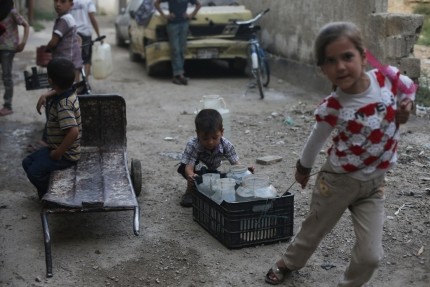
16 September 2015 – The United Nations Children’s Fund (UNICEF) has condemned in the strongest terms mortar attacks on civilian areas of Aleppo, Syria, which reportedly killed at least 19 children yesterday, including six in a UNICEF-supported child friendly space.
“Child friendly spaces enable children to play and reconnect with their childhood, and forget, even if for a short time, the horrors of war. They must never be targeted,” Hanna Singer, UNICEF Representative in Syria said in a statement.
“This reprehensible attack shows that even the simple act of playing represents a grave danger for children in Syria,” she added.
In recent weeks, several indiscriminate attacks have been reported in civilian populated areas leading to the death and injury of scores of children.
“These attacks highlight a flagrant disregard for the laws of war. They are a stark reminder that nowhere in Syria is safe for children,” Ms. Singer warned.
UNICEF is calling on all parties to the conflict in Syria to immediately halt such attacks and do their utmost to protect civilians and civilian infrastructure such as schools, health clinics and water facilities, in accordance with international humanitarian law. The agency urged that all civilians including children to be protected at all times.
In his briefing to the UN Security Council today, Under-Secretary-General for Humanitarian Affairs Stephen O’Brien highlighted the impact of the conflict on Syria’s children and young people.
“Today, Syria is one of the most dangerous places on earth to be a child,” he stated, adding that over 5.6 million children are in need of immediate assistance. In addition, children continue to be murdered, tortured and subjected to sexual violence by all parties to the conflict. “Millions of children have been traumatized by the horrors they have witnessed.”
In addition, Mr. O’Brien noted that, although the school year commenced this past week, over two million children – one out of every three – are not in school in Syria, and an additional 450,000 children are at risk of dropping out. He also expressed his concern that, in areas controlled by the Islamic State of Iraq and the Levant (ISIL), schools were using a curriculum designed by the terrorist group.
